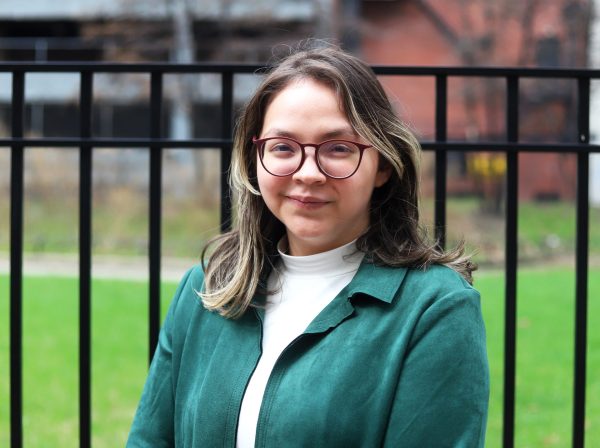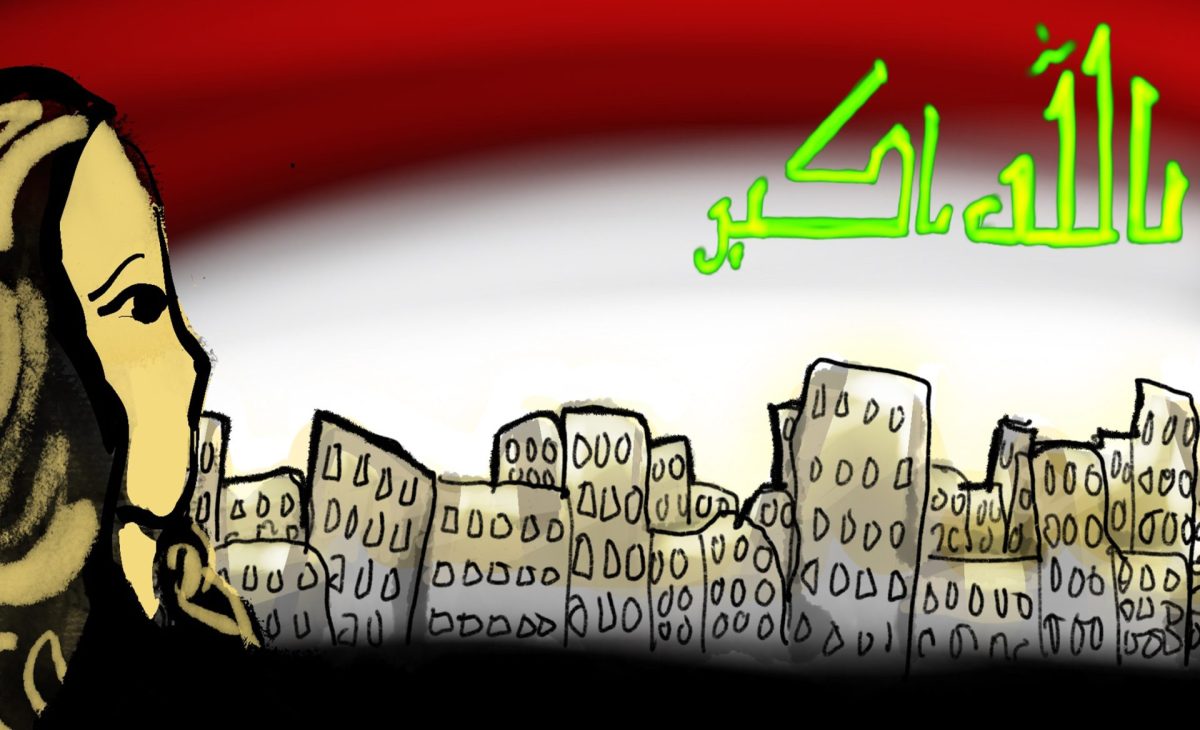More than two decades after the outbreak of war in Iraq, cities like Fallujah continue to deal with serious health consequences, likely from toxic war pollutants. Researchers have documented birth anomalies and cancer, sometimes in people who weren’t even alive when conflict was active.
Kali Rubaii, an assistant professor of anthropology at Purdue University, visited DePaul on April 21 and discussed these impacts before a packed room in Arts & Letters Hall, drawing on her decades of fieldwork in Iraq.
“It’s really important to keep this historical memory alive, so we can all learn from it,” said Rubaii, who is an expert on the environmental and health consequences of militarism.
Painting a vivid picture for listeners, she included various personal anecdotes and photos documenting her own experiences.
At one point, an image of a small bucket of dirty water appeared on the screen: her drinking water in Fallujah. Rubaii showed it to highlight the lack of such critical resources in war-torn areas.
Another focal point was infrastructure destruction and environmental contamination that she said have targeted generations of Iraqis. More than half of the 39,000 homes in Fallujah in the early 2000s were damaged, as it was a central battleground in the war.
Rubaii emphasized the lack of care for civilians — farmers, fishermen and urban residents — who lived through decades of warfare, occupation and oppression.
Faces in the audience were solemn as she recalled the story of a man whose children were born with fatal anomalies that he attributes to handling scrap metal and weaponry. He said the children he had before he began working in the industry were healthy.
Currently, Rubaii is leading researchers on the Parts Per Million Project, which seeks to investigate and unearth the causes of large-scale birth irregularities in Fallujah.
Attendees took notes and listened intently.
“The presentation was very eye-opening,” DePaul junior and political science major Jenna Habib said. “People tend to look at war in a very obvious way.” She said she feels there is a general lack of understanding of “what happened there and what the U.S. had to do with it.”
Habib added that she hadn’t previously given much thought to the role that academics play in societies where wars are frequent.
“Meeting someone face-to-face that is helping build the narrative that’s going to become the history that students read a hundred years from now, that’s a great experience,” she said.
Amalia O’Shaughnessy, a DePaul senior majoring in political science, said she appreciated the unique perspective Rubaii brought, saying that it was “fascinating” to hear from an anthropologist.
“I’ve never heard that side of it, especially on the topic of war,” O’Shaughnessy said.
Rubaii said she finds it worrying that despite the fact that “the war on terror fundamentally transformed so many aspects of peoples’ lived experience all over the world and especially in the United States,” many students aren’t aware that the world they’re living in is very different than the one that existed a couple decades ago.
Kaveh Ehsani, associate professor and associate chair of the department of international studies, echoed this concern.
“I’m always shocked when I ask my bright students … what they’ve learned about the conflict, and they don’t know much,” he said.
Following the presentation, students were eager to engage in a discussion focused on activism, policy change, community solidarity and the role that defense contractors and private corporations take in postwar reconstruction.
Ehsani added that a crucial step in enacting change is having people engage in these open discussions as “the damage is continuing and yet we’re still repeating the same mistakes.”
Rubaii reflected, “The fact that everyone is showing up and thinking about these things speaks to how aware we are, … that our resources are going to places we don’t necessarily want them to go.”
“There are many ways of imagining how we want the world to be in the future that can be informed by learning about how the world was, for better or worse.”
Related Stories:
- Political science department at DePaul hosts panel on current political climate
- Conference on Student Activism and Social Change returns, connecting the past with the present
- DePaul’s Faith Unfiltered event explores the intersection of faith, literature and personal belief with Professor Paula McQuade
delivered to your inbox every Monday.
Support Student Journalism!
The DePaulia is DePaul University’s award-winning, editorially independent student newspaper. Since 1923, student journalists have produced high-quality, on-the-ground reporting that informs our campus and city.
We rely on reader support to keep doing what we do. Donations are tax deductible through DePaul's giving page.



